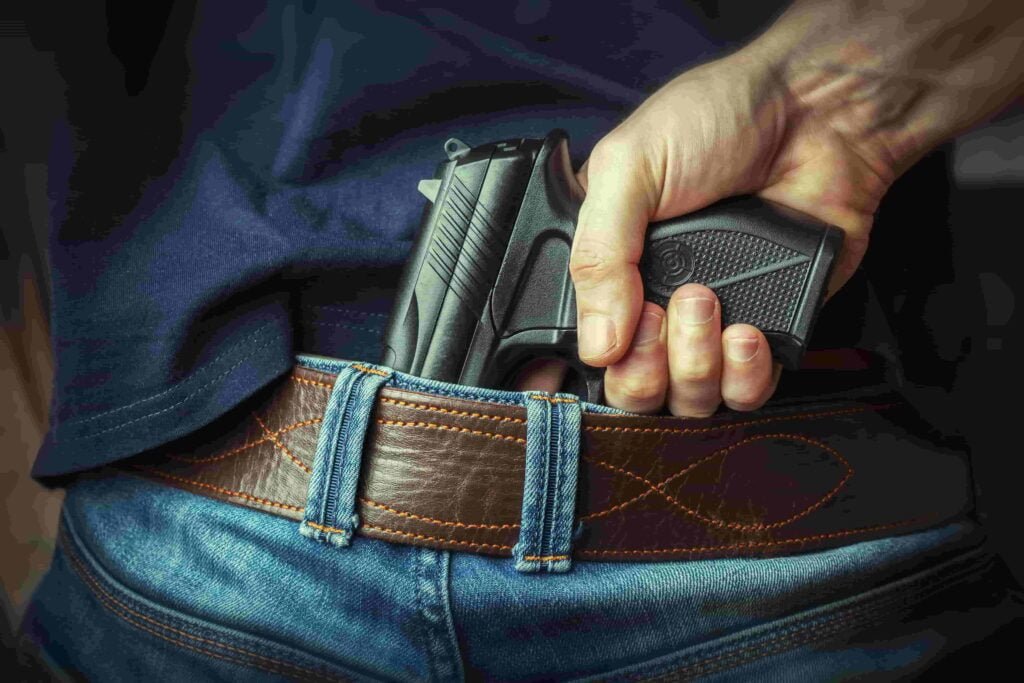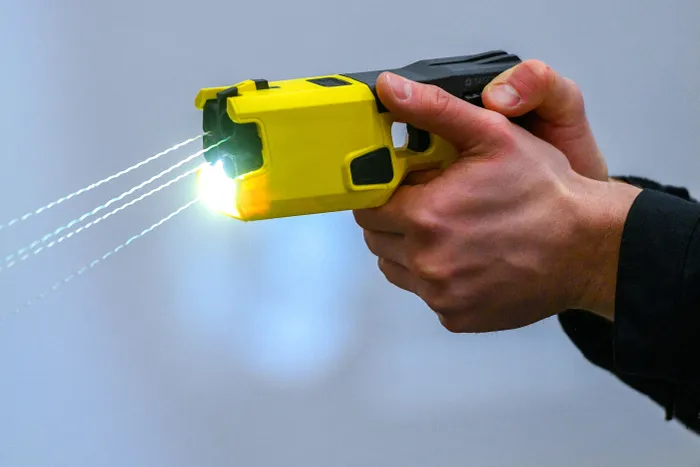Are Stun Guns Legal in North Carolina:- The laws governing Tasers and stun guns vary from state to state in the United States, however courts have overturned outright prohibitions on consumer possession or carrying of these weapons. Tasers and stun guns are frequently utilised by police, but they are also routinely used by civilians as a form of self-defense.
For the Web-Story of this Article “Click Here“.
Due to court rulings stating that these weapons fall under the Second Amendment’s right to carry arms, the majority of citizens in the United States are permitted to own stun guns and Tasers. Who can purchase stun guns and Tasers, where they can be carried, and when they can be used are still frequently subject to permit requirements and other limitations.
Stun guns are permissible to own and use in North Carolina. A stun gun is a non-lethal weapon that renders a target unconscious via electric shock.
In North Carolina, stun guns are lawful to buy and use, but it’s against the law to have one on you at all times. Stun weapons can be kept in vehicles or homes, but they cannot be worn on the person.
What Are Tasers and Stun Guns? How Do They Function? (Are Stun Guns Legal in North Carolina)
Consumer-grade hand-held gadgets that use an electrical charge to momentarily stun or disable the target fall into one of two categories:
Stun weapons deliver an electric jolt when they come into contact. Two metal prongs at the end of a stun gun conduct electricity when it is activated (often by pushing a trigger). When the target comes in contact with these electrified prongs, an unpleasant jolt is administered. The shock has the potential to temporarily render the subject unconscious or stunned.
Tasers are guns-like gadgets that fire tiny darts or probes that are connected to thin, flexible wires. Electricity is transmitted through the wires when the darts strike the target. Electric pulses that travel between the probes disable the target by interfering with its neuromuscular system. The user of the Taser can deliver many electrical cycles once the probes are in position. Taser consumer models have a maximum range of 15 feet.
Is a taser the same as a stun gun?
There is much misunderstanding regarding the distinction between stun guns and tasers; however, the quick answer is that while they are both forms of stun devices, stun guns and tasers are not the same thing.

How Far Away Can a Stun Gun Be Effective?
A stun gun is a tool that, when used, delivers an electric jolt. It can be used to render an assailant helpless. Before using a stun gun, it’s crucial to know how far away it will be effective.
Depending on the model, a stun gun may only be effective up to a certain distance. The voltage of stun guns is used to categorise them. The range of the stun gun increases with voltage.
Around 500,000 volts is the voltage of standard stun guns. They can operate up to 21 feet away. Stun weapons with higher voltages can reach voltages of up to 2,000,000 volts. They can operate up to 25 feet away.
There are stun guns with laser sights. The voltage of these stun guns can reach three million volts. They can operate up to 30 feet away.
Stun Gun Regulations in North Carolina
Stun weapons are allowed to own in North Carolina for self-defense purposes, but there are certain limitations. A valid concealed carry permit is required in order to carry a stun gun, as stated by North Carolina General Statute 14-269.7. This indicates that while carrying a stun gun openly is permitted in North Carolina, carrying one covertly requires a concealed carry permit.
Additionally, giving or selling a stun gun to a child or someone with a criminal record is prohibited. The fact that stun guns are not classified as firearms under North Carolina law means they are not governed by the same laws as firearms.
Taser Regulations in North Carolina
In North Carolina, it is lawful to own a Taser for self-defense, but there are limitations on how it can be used. The use of a Taser against a law enforcement officer or other official who is discharging their duties is prohibited by North Carolina General Statute 14-269.8, even if you are acting in self-defense.

A Taser cannot be sold or given to a youngster or someone with a criminal record, for example. Finally, it’s crucial to remember that using a Taser may be construed as using lethal force under North Carolina law, thus it should only be utilised in circumstances where doing so would be appropriate.
What Qualifies in North Carolina as a Stun Gun?
Stun guns and Tasers are the two most common kinds of hand-held weapons that can temporarily render a person unconscious with an electrical charge. On close contact, stun guns deliver a harsh shock.
Small darts coupled to thin wires that convey the electrical charge are shot from a distance to operate tasers, a brand name that has become the common term for all comparable devices. Tasers and stun guns are regulated differently in some states.
The word “stun guns” is not defined by North Carolina law; it only applies to these specific weapons. The Taser provisions, however, apparently also apply to stun guns.
How to Determine whether You Need a Taser or Stun Gun Permit:-
If you need a permit to purchase a stun gun or Taser, as well as any other limitations on where and how you can carry these weapons (openly or concealed), will depend on state and municipal regulations, as well as how courts and attorneys general interpret these laws.
Some online sources assert to offer exhaustive, 50-state solutions to the issue of legal ownership and use. These websites are mostly for-profit businesses that also sell the devices; some of them at least caution visitors not to rely on their oversimplified solutions. Given how quickly the law is changing in this area, they can likewise be out of date.
However, you might be able to receive more reliable responses by simply contacting your neighbourhood police department or by going online and visiting the state website managed by the organisation responsible for issuing gun permits.
If you’ve already encountered legal issues related to the use or possession of a stun gun or Taser, you should contact an experienced criminal defence attorney right away.
The local laws that relate to your circumstance and how local courts and law enforcement interpret those laws should be explained by an experienced lawyer in this area. A lawyer can clarify your legal alternatives if you feel that being tasered by police constituted the use of excessive force.
Penalties for Breaking the North Carolina Taser and Stun Gun Laws
Criminal charges and penalties may be imposed for violating North Carolina’s laws regarding Tasers and shock guns. For instance, it is a Class 2 misdemeanour to carry a hidden stun gun without a valid licence; the penalty for this offence is up to 60 days in jail and a fine of up to $1,000.
A Class 1 misdemeanour carrying a $1,000 fine and up to 120 days in jail is selling or providing a Taser or shock gun to a youngster or a felon.
Tasering a law enforcement officer or other official who is carrying out their duties can result in criminal charges, which include fines and prison sentences of up to $100,000 and 20 years, respectively. These laws are in place to protect both people and law enforcement personnel, so it’s crucial to take them seriously and comprehend the repercussions of breaking them.
It’s also crucial to remember that Tasers and stun guns should only be used sparingly and when absolutely necessary in self-defense scenarios. The use of excessive force while using these devices could result in criminal charges and other legal repercussions.
In general, it’s critical for citizens of North Carolina to be aware of the regulations controlling the ownership and application of Tasers and shock guns. Although it is acceptable to own these weapons for self-defense, there are some limitations and guidelines that must be adhered to. It’s crucial to use Tasers and shock guns sensibly and only when using lethal force would be appropriate, like with any self-defense tool.
It is advised that you get advice from a lawyer or law enforcement agency if you have any queries concerning the stun gun and Taser legislation in North Carolina.